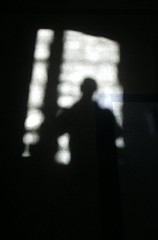P mesle Pelican
An old hermit lives in a slum and wants to teach the alphabet to the children who regularly go there to play. What makes the hermit happiest however, is when he comes to the letter P (for "Pedarsag", or "Puppy"). When a child proposes he use the word "Pelican" instead, the hermit goes to the nearby park looking for this animal he has never heard of. (Parviz Kimiavi, 1972) || Momigliano speculates that a new attitude toward documents appeared during the Late Empire and that it heralded the future method of scientifically directed history; the Augustan History and especially Eusebius' Ecclesiastical History display evidence of a "new value attached to documents." I confess that these works have left me with a rather different impression. (Paul Veyne, Did the Greeks believe in their myths? (1988: pp.12-3)) || Auch fällt es dem Menschen durchaus nicht schwer, an Wunder einer früheren Zeit zu glauben; allein einem Wunder, das heute geschieht, eine Art von Realität zu geben und es neben dem sichtbar Wirklichen als eine höhere Wirklichkeit zu verehren, dieses scheint nicht mehr im Menschen zu liegen, oder wenn es in ihm liegt, durch Erziehung ausgetrieben zu werden. Unser Jahrhundert wird daher auch immer prosaischer werden, und es wird, mit der Abnahme des Verkehrs und Glaubens an das Übersinnliche alle Poesie auch immer mehr verschwinden. - There is no difficulty for humans to believe in miracles of an earlier time; yet, to admit the reality of a miracle taking place today, and to revere it as a higher reality residing beside the visibly real, this appears no longer within the grasp of humans, or if it is within their grasp it is driven out of them by education. Our century will thus become ever more prosaic, and with the decline in conversation about and belief in the metaphysical all poetry is bound to vanish. (JP Eckermann, Gespräche mit Goethe, Reclam, 1994, p.495, transl. mine) || "For centuries past," says Herodotus, "the Greeks have distinguished themselves from less civilized peoples by their greater awareness and lack of foolish credulity." (Veyne, p.31) || Selbst der radikale Regisseur, der entscheidende wirtschaftliche Vorgänge wie etwa die Fusion zweier Industriekonzerne darstellen wollte, könnte das nicht anders, als indem er die maßgebenden Herren im Büro, am Konferenztisch und in der Villa vorführe. Auch wenn er sie dabei als Bestien demaskierte, bliebe ihre Bestialität noch sanktioniert als die von Individuen und würde tendenziell die Bestialität des Systems entlasten, als deren Henkersknechte sie operieren. - Even a radical film director who wants to portray crucially important economic processes like the merger of two industrial concerns could only do so by showing us the dominant gentlemen in the office, at the conference table or in their mansions. Even if they were thereby revealed as savage beasts, their savagery would still be sanctioned as a quality of individual human beings in a way that would tend to obscure the savagery of the system on the behalf of which they act as murderous lackeys. (T.W. Adorno, Die Dialektik der Aufklärung, transl. mine) || ...the Greek aristocracy wavered between two attitudes toward legend: to be pragmatic and participate in popular credulity, for the people believe as docilely as they obey; or else to refuse, on their own account, a humiliating submission, which was perceived as a result of naiveté. Understanding is the first of privileges. (Veyne, p.31)

